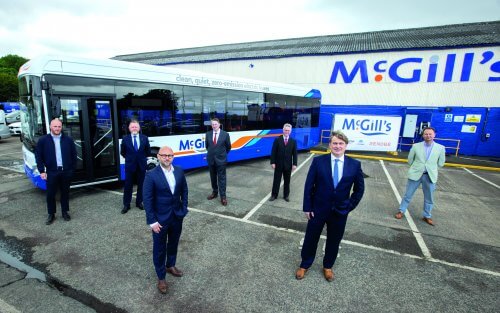
Work has started on the transformation for zero-emission electric vehicles at depots owned by McGill’s Buses. New charging infrastructure is being installed by Zenobē to fully electrify the operator’s depots in Johnstone, Inchinnan and at Xplore Dundee. Zenobē is an independent owner and operator of battery storage, which powers 20% of the EV bus market in the UK. The project is scheduled to be completed ahead of the delivery of 68 electric vehicles to McGill’s following a £32.5million investment partly funded by the Scottish Government’s Scottish Ultra Low Emissions Bus Scheme (SULEB), which has pumped over £50 million into Scotland’s renewable transport sector, helping the country move towards achieving its legally binding net zero ambitions.
The buses will be delivered in the autumn, entering service before the COP26 summit gets underway in Glasgow in November. The firm is installing 38 DC chargers, and on an average night believes it will need around 28MWh of energy to charge the buses in all three sites.
Managing the power will be Zenobē’s software which allows McGill’s staff take a complete view of all depot’s charging from a single location. Installation of charging infrastructure got underway at an event held at the Inchinnan depot, attended by McGill’s owners Sandy and James Easdale, McGill’s CEO Ralph Roberts, Zenobē Director Arron Dowie and Head of Technical Sales Mark Oxtoby. Also in attendance were Richard Crump and Ian Downie from Pelican Yutong, which is supplying the majority of the new electric buses.
Ralph Roberts, Chief Executive of McGill’s Group, said: “The introduction of electric vehicles will lead to a huge reduction in CO2 emissions from our operations and McGill’s is excited to be leading the way with the largest electric fleet in Scotland operational by COP26 in November. Transforming our depots to get ready for these new buses is a hugely important part of the jigsaw and we’re delighted to start that process with Zenobē Energy today.”
Steven Meersman, a Co-Founder of Zenobē, added: “We are thrilled to be working with McGill’s, a home-grown company just like Zenobē, embracing the EV bus transition with an ambitious strategy to develop three key depots. This exciting project will help to boost accessibility to sustainable travel in Scotland and support the country’s drive towards net zero. The three depots are a shining example of what’s possible when private organisations and government work together towards a common goal and this will lead to tangible benefits for both passengers and the environment.”
Work on decarbonisation of its fleet was also welcomed by the Scottish Government. Cabinet Secretary for Net Zero, Energy and Transport Michael Matheson said: “I warmly welcome the work to install charging infrastructure across McGill’s depots. It’s fantastic to know that electric buses will be running in Glasgow ahead of COP26.
“Choosing bus has always been a positive choice for our environment and a bus with no emissions at the tailpipe is even better. That’s why we’re supporting bus operators, including McGill’s, through our Scottish Ultra-Low Emission Bus Scheme to help operators take climate action and realise their ambitions for a zero-emission bus fleet. By continuing to work in partnership through our Bus Decarbonisation Task Force, we can get electrically-powered buses into our communities faster – improving air quality, making electric transport available to all and supporting Scotland’s world leading target of net zero by 2045.”
James Easdale, Chairman of McGill’s Group, added: “We firmly believe the new electric fleet will entice more people to leave their car keys at home and switch to the bus. Electric buses bring a new level of passenger experience, including air conditioning and USB charging, coupled with a whisper quiet journey. It’s an exciting time for McGill’s as we continue to invest and grow the business even further.”
Sandy Easdale, Co-Owner of McGill’s Group, continued: “We led the way in introducing clean diesel Euro VI fleet and by the end of 2021, the McGill’s Group will operate more electric buses than any other company in Scotland. We are fully committed to playing our part in creating a clean and sustainable public transport system and we’re delighted to work with suppliers such as Zenobe, and the Scottish Government, to make this happen.”

